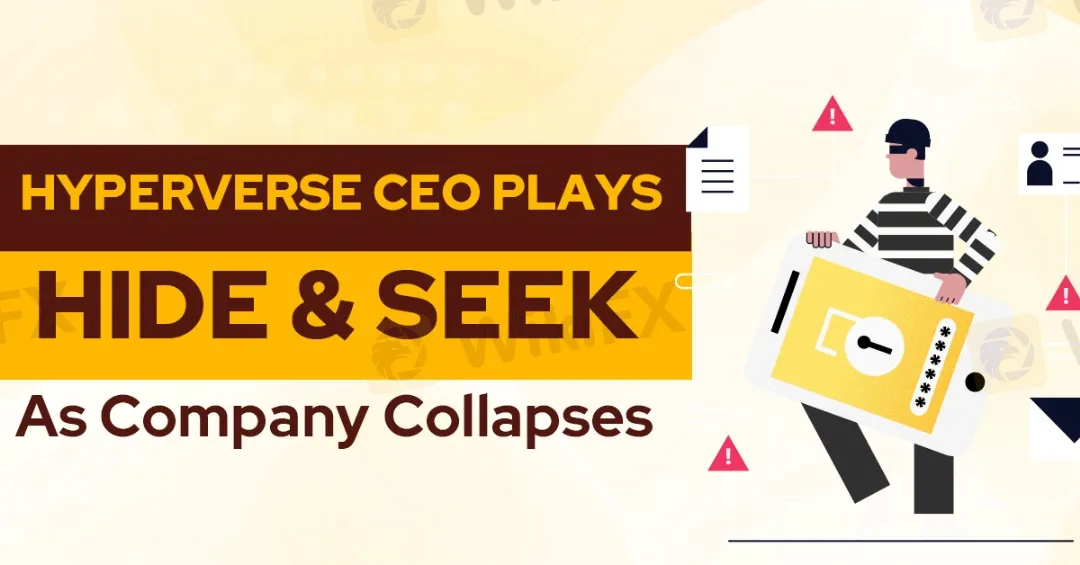简体中文
繁體中文
English
Pусский
日本語
ภาษาไทย
Tiếng Việt
Bahasa Indonesia
Español
हिन्दी
Filippiiniläinen
Français
Deutsch
Português
Türkçe
한국어
العربية
HYPERVERSE CEO Plays Hide & Seek As Company Collapses
Abstract:Unraveling the HyperVerse saga: amidst company collapse, the CEO vanishes, leaving questions in the wake of Blockchain Global's downfall, celebrity endorsements, and regulatory scrutiny.

The collapse of the bitcoin company Blockchain Global, led by Australian entrepreneur Sam Lee and his partner Ryan Xu, birthed HyperVerse, now under international scrutiny for its alleged pyramid scheme structure.
At the core of the controversy lies Steven Reece Lewis, introduced as HyperVerse's CEO during an online launch. Despite touting impressive credentials, an investigation by Guardian Australia unearthed discrepancies and false assertions about Lewis's educational and professional history.
The absence of any records of Steven Reece Lewis at reputable institutions like the University of Leeds and the University of Cambridge, along with a lack of presence in official registries such as Companies House in the UK or SEC filings in the US, raises skepticism. Additionally, major corporations like Adobe and Goldman Sachs have no trace of his employment.
Lewis's online footprint seems confined solely to HyperVerse, marked by a Twitter account initiated just a month before the scheme's launch, which went inactive six months later. Such unverifiable background information casts doubts on his professed qualifications and involvement in HyperVerse.

The scheme's credibility was bolstered by promotional videos featuring endorsements from high-profile figures like Apple co-founder Steve Wozniak, actor Chuck Norris, comedian Jim Norton, and singer Lance Bass. However, these endorsements were likely secured through the paid platform Cameo.
Sam Lee, initially linked to HyperVerse, refutes involvement in the scheme, especially regarding its transition to HyperNation. His precise role in founding and running HyperFund and HyperVerse remains ambiguous, as he has not addressed queries seeking clarification.
Blockchain Global, co-founded by Lee and Xu, faces a $58 million debt to creditors, prompting a regulatory audit by the Australian Securities and Investments Commission (ASIC). Despite concerns raised about HyperVerse, ASIC currently indicates no immediate regulatory action, a decision questioned as the scheme has been flagged by overseas regulators.
HyperVerse, pitched as a revolutionary digital metaverse, aimed to rival Facebook's virtual domain, claiming to transform global interactions and business operations. Promising substantial returns – a minimum of 0.5% daily, totalling a 300% return over 600 days – and offering incentives for member recruitment, HyperVerse adopted common tactics seen in pyramid schemes.
However, despite these enticing assurances, the analysis firm Chainalysis estimated losses to HyperVerse in 2022 at approximately $1.3 billion.

Disclaimer:
The views in this article only represent the author's personal views, and do not constitute investment advice on this platform. This platform does not guarantee the accuracy, completeness and timeliness of the information in the article, and will not be liable for any loss caused by the use of or reliance on the information in the article.
Read more

Global Brokers Vs. Indian Rules: Why They Struggle in India
RBI issued a warning last year against 75 forex brokers. Those brokers are globally popular and regulated in other countries, but they are banned in India. Only few brokers even have physical offices located in India. So, why do global brokers face so many challenges in entering the Indian market?

33,000 Jobs Lost Across the Private Sector in the US in June, Says ADP National Employment Report
The ADP National Employment report revealed 33,000 job losses across the private sector in the US during June 2025. Check out the job losses based on different sectors, regions and establishment type.

FCA Overhauls Rules on Non-Financial Misconduct in Financial Services
The FCA has launched a new consultation to strengthen rules against non-financial misconduct, aiming to align standards across the financial services industry and bolster public trust.

Tokenized Stocks: Innovation or Just Another Wrapper?
While tokenized stocks promise global, round-the-clock trading, many platforms only offer synthetic exposure similar to CFDs. Without shareholder rights or deep liquidity, their added value remains in question.
WikiFX Broker
Latest News
Elon Musk's xAI raises $10 billion in debt and equity as it steps up challenge to OpenAI
European Central Bank's tightening cycle is done,' chief economist says
ACY Securities Expands Crypto CFD Offering with 24/7 Trading Access
Revelation: Makeup Artist, Social Media Influencer Involved in INR 1.62 Cr Forex Trading Scam
Social Trading Goes Mobile at M4Markets
Capital.com Strengthens UK FinTech Ties with Key Memberships
Crypto Craze Fizzling Out? Here is Why
10-year Treasury yield ticks higher as investors eye jobs report
Public companies bought more bitcoin than ETFs did for the third quarter in a row
Tokenized Stocks: Innovation or Just Another Wrapper?
Currency Calculator


